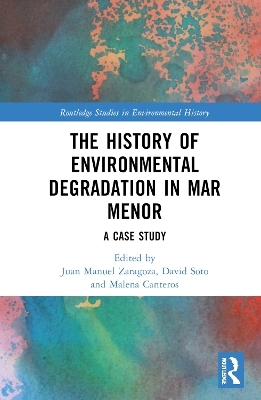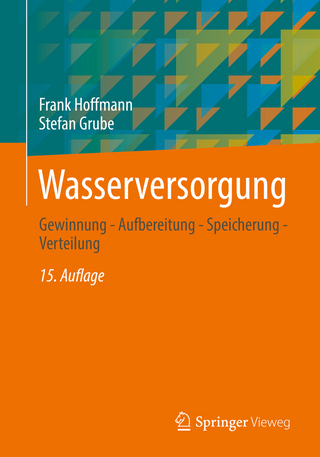
The History of Environmental Degradation in Mar Menor
Routledge (Verlag)
978-1-032-78696-4 (ISBN)
- Noch nicht erschienen (ca. Februar 2025)
- Versandkostenfrei innerhalb Deutschlands
- Auch auf Rechnung
- Verfügbarkeit in der Filiale vor Ort prüfen
- Artikel merken
All ecosystems change over time, although in some cases, this variation is more dynamic and evident. The Mar Menor is a clear example of this ‘ecological transition’, as it is the largest coastal lagoon in the western Mediterranean and the first ecosystem in Europe to be granted legal personhood rights. This book provides an extensive overview of the history of its environmental degradation over the past 100 years, highlighting the subsequent succession of environmental crises including phytoplankton explosions, the disappearance of large areas of submerged meadows due to eutrophication, and episodes of mass mortality of aquatic fauna. Split into three sections to reflect thematic blocks, the book begins with a comprehensive description of the Mar Menor and its marine ecosystems, emphasising its ecological value and unique space in Spain and Europe. It discusses intensive and globalised agriculture, surrounding agro-export, and the laws that legislate it. In the second part, the book draws on a series of cultural concepts, theoretical frameworks, and participatory arts-based research to enrich our understanding of the environment from multiple perspectives. Finally, in the third part, the book uses analysis gathered from the Mar Menor case study to discuss wider conclusions about the ways in which we can begin to undo our damage to the environment and restore ecosystems.
The book will be useful for students, academics and researchers interested in environmental justice, environmental history and anthropology, sustainable development, and environmental studies more broadly.
Juan Manuel Zaragoza is a postdoctoral researcher at the University of Murcia (Spain). From 2013 to 2015 he was a Marie Curie Research Fellow at the Centre for the History of the Emotions at Queen Mary University of London, and from 2015 to 2016 a BBVA Foundation Leonardo Fellow. His research has focused on the history of experience and emotions, specifically around the experiences of discomfort and well-being. He is PI of the project Climate crisis, mental health and well-being in the Anthropocene, and founding director of the research collective ehCOLAB (https://www.um.es/ehcolab/) interested in the development of the blue humanities. David Soto is a Full Professor of Moral Philosophy at the University of Murcia and the Head of the Department of Philosophy at the same university. He has also been a Full Professor at the Universidad del Pacífico in Ecuador. His work focuses on the study of the philosophical and political dimensions of the crisis of the 1930s and 1970s, especially in Spain and Latin America. He has also worked on environmental ethics and environmental public policies in the Southeast Pacific, editing five collective books with the Universidad del Pacífico, the last one entitled: La Declaración de Santiago de 1952: una alianza del Pacífico Sudeste sobre políticas marítimas y ambientales. Some of his most recent publications are Filosofía política y ética: claves conceptuales para comprender el presente; “Políticas del terror: subjetividad neoliberal y populismo autoritario”, en: Turpín Saorín, J. (ed.). Antropología en devenir político (2023). Malena Cantero, graduated in Philosophy from the University of Murcia (Spain). She has completed a Master's degree in Philosophy Research with a specialization in Contemporary Aesthetics, as well as another Master's degree in Teacher Training, both at the University of Murcia. Her current area of interest is the relationship between climate change and mental health through a gender perspective.
Foreword: The Mar Menor Coastal Lagoon and Its Three Greens
Introduction
1.The Mar Menor – The Transition of an Ecosystem Over Time (Its Crises In The Last 200 Years)
2. Ecosystems and biodiversity in the frontiers of the Mar Menor lagoon: birds as alert bioindicators of environmental change
3. Agrarian reason, deep histories and environmental destruction in the Campo de Cartagena-Mar Menor: A Gramscian world-ecology perspective
4. The ecological degradation of the Mar Menor. Power, science, and deep stories in Global agriculture
5. Impacts of mining in the Sierra Minera on the Mar Menor lagoon
6. Cultural Landscapes’ Deterioration as Losing one’s Aesthetic Environment: the case of Mar Menor
7. Monstrous Lagoon: Creatures of Art and Science in the Mar Menor
8. A citizen assembly for transitioning in the Mar Menor?
9. The rights of Nature and the case of the Mar Menor. Implementation of Law 19/2022 of 30 September and enforcement in the judicial sphere
10. The Mar Menor (Spain) and incipient European regulations: from ecological restoration to agricultural flexibility
11. La Manga del Mar Menor. Architecture for environmental colonisation
12. The Assembly of the Gaze: Composing Wetlands in a Glocal World
13. Thick Presents. Stories for an ecosocial transition
14. Capital against nature: accumulation by dispossession and externalization in the
15. Minor Emotions: How to live in a damaged environment
Index
| Erscheint lt. Verlag | 28.2.2025 |
|---|---|
| Reihe/Serie | Routledge Environmental History |
| Zusatzinfo | 2 Tables, black and white; 11 Halftones, black and white; 11 Illustrations, black and white |
| Verlagsort | London |
| Sprache | englisch |
| Maße | 156 x 234 mm |
| Themenwelt | Naturwissenschaften ► Biologie ► Ökologie / Naturschutz |
| Weitere Fachgebiete ► Land- / Forstwirtschaft / Fischerei | |
| ISBN-10 | 1-032-78696-5 / 1032786965 |
| ISBN-13 | 978-1-032-78696-4 / 9781032786964 |
| Zustand | Neuware |
| Informationen gemäß Produktsicherheitsverordnung (GPSR) | |
| Haben Sie eine Frage zum Produkt? |
aus dem Bereich


